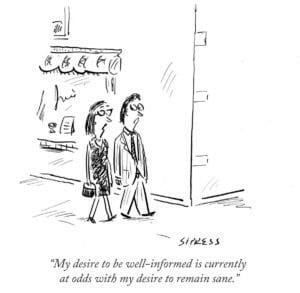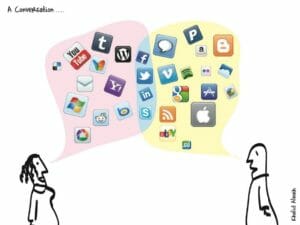Staying sane while reading the news during a pandemic

You’ve all seen the cartoon. David Sipress is the man who created it. In the New Yorker, he wrote about being a news cartoonist: here.
During a global crisis like the Covid-19 pandemic, how do you stay informed and stay sane?
Remove hyperbole and false news from your life
Vet the people
As the pandemic started to take shape in America, I got diligent about “writing off” the word of people who go on an outraged rant based on false or exaggerated information. They post about illegal, immoral, or morbid stories concerning hospitals, the CDC, pharmaceutical companies, employers, or the Trump administration.
To do:Do not open links about Covid-19 on Facebook or Twitter, unless the friend posting is reliable.
Do not open outraged posts unless you have already verified that the news is accurate.
Verify the news
 Check almost everything you read for authenticity. Facebook remains a place for posts about things that never happened, bad things that happened years ago posted as if they just happened, and exaggerated things.
Check almost everything you read for authenticity. Facebook remains a place for posts about things that never happened, bad things that happened years ago posted as if they just happened, and exaggerated things.
These kinds of posts draw many clicks. Those clicks are counted and are good for business. But they are no good for us.
Some tools you can use
Snopes:
I watched how often a news source showed up on the “false” or “unproven” categories on Snopes. (If you don’t know about Snopes, go there now. You can read my blog later.)
Snopes is a news verification source that should be your best friend. You input key words of a news story and find out if there is verification. You can send them a story for verification, if it isn’t there yet.
If you get chummy with Snopes, you will see that half or more than half of the news from certain sites comes up as false or partly true. Those are the sites to stop reading, even when your friend sends their link.
Google:
A true story will be found on a Google search. Hallmarks to look for: similar information, similar dates.
Using Google and Snopes, I identified left-leaning and right-leaning sources that fall in the “false” category more often than not. Most are blogs posing as journalism. Some are partisan sites trying to stir up outrage. Some are blogs, prospering from click-bait titles and stories.
To do: Verify that a story is current and also mostly true before getting excited about it. Keep lists of news sources where stories are usually verifiable or usually false. Stop reading unreliable sources, even if they reinforce your politics. Develop your list of reliable sources. Extra credit: subscribe and support reliable news sources.
Control the volume
- Once you find go-to news sources, stick with them.
- Limit your Covid-19 on Facebook and Twitter. Some people need a “no Covid-19” rule. Some need a limit on the number of topics to look at daily.
- Limit your time on all social media. You might answer a Tweet or a Messenger ping, but you do not need to then go down the Twitter or Facebook rabbit hole every time the phone pings you.
- Don’t read news after 7 PM, unless something is breaking that night.
- If you find an email list that is providing good information, keep it. If you open an email list four times in a row and nothing useful is there, unsubscribe.
My current subscriptions for my daily news:
Regarding Covid-19:
Local resources:
Somerville list of open/closed businesses
Somerville restaurant/food delivery